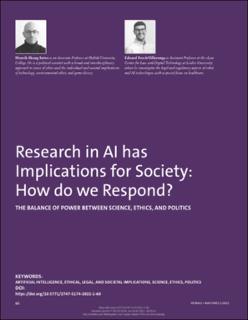| dc.description.abstract | Artificial intelligence (AI) offers previously unimaginable possibilities, solving problems faster and more creatively than before, representing and inviting hope and change, but also fear and resistance. Unfortunately, while the pace of technology development and application dramatically accelerates, the understanding of its implications does not follow suit. Moreover, while mechanisms to anticipate, control, and steer AI development to prevent adverse consequences seem necessary, the current power dynamics on which society should frame such development is causing much confusion. In this article we ask whether AI advances should be restricted, modified, or adjusted based on their potential legal, ethical, societal consequences. We examine four possible arguments in favor of subjecting scientific activity to stricter ethical and political control and critically analyze them in light of the perspective that science, ethics, and politics should strive for a division of labor and balance of power rather than a conflation. We argue that the domains of science, ethics, and politics should not conflate if we are to retain the ability to adequately assess the adequate course of action in light of AI‘s implications. We do so because such conflation could lead to uncertain and questionable outcomes, such as politicized science or ethics washing, ethics constrained by corporate or scientific interests, insufficient regulation, and political activity due to a misplaced belief in industry self-regulation. As such, we argue that the different functions of science, ethics, and politics must be respected to ensure AI development serves the interests of society. | en_US |
